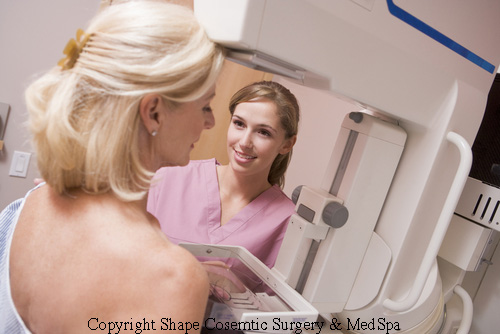
Preparing for your cosmetic surgical procedure may include Blood Work / Mammogram / EKG Information, or other diagnostic testing, depending on your heath and your procedure. The purpose of a preoperative evaluation is to determine if you are healthy enough to undergo the planned procedure, and to maximize your safety when you are treated surgically. Surgery is really nothing more that a controlled injury, and your body responds to surgery just as it would to any other stress. You will find that you may feel slightly frightened or anxious both before and after surgery. This is your body’s fight or flight response in action. After surgery, you will also find that you retain fluids, and your weight may increase several pounds rapidly. This is simply another manifestation of your body’s response to stress and will resolve as your recovery progresses.
Other organs are involved in the stress response as well, and it is for this reason that much of the testing is done. It is important to know that the function of your heart, lungs, liver, and kidneys are adequate. If not, you may need to have some medical “tuning up” prior to your surgery. If this is the case, our Physician will have you go see you Primary Care Doctor for possibly more testing to see if you are cleared to proceed with your cosmetic surgery.
Blood Work
At your Pre-Operative appointment you may be given a lab order form to have your blood drawn prior to your procedure. You may take this lab order form to any lab of your choice. Blood will be drawn to determine the number of oxygen-carrying red blood cells (RBCs) that you have. This same test can also determine the number of infection-fighting white blood cells (WBCs) you have, as well as the number of clot-forming cells called platelets. You will probably hear your doctor talk about your hemoglobin (the amount of iron in your red blood cells), your hematocrit (the volume of RBCs in your blood), and your white count (the number of WBCs in your blood). If any of your lab test results are not within normal range, our nurse will give you a call in regards to your lab test results.
Unusual values in these numbers may require a postponement of your surgery until it can be determined why you have abnormal results. In most otherwise healthy people, this test comes back normal. The next test is called a coagulation profile, sometimes referred to as a PT and PTT. This test is designed to determine if your blood clots in the normal fashion. As you can imagine, performing surgery on a patient whose blood does not clot normally can be quite a challenge. Medications can be administered to temporarily correct abnormal blood clotting; however, if you are scheduled for elective surgery and you have a disorder of coagulation, your surgeon will want to know where the problem lies and will try to correct the problem prior to your operation. At a minimum, you will also have blood drawn to determine your kidney (also called renal) function. These two tests measure the amount of protein breakdown products circulating in your blood, namely blood urea nitrogen (BUN) and creatinine; again, it is important to have normal kidney function prior to surgery. If your test shows abnormalities in this regard, you will probably be asked to see a nephrologist (kidney doctor) prior to surgery. Other common tests prior to surgery include a glucose level to determine if you have diabetes, and one to measure electrolyte levels.
Chest X-ray
The preoperative chest x-ray (CXR) is not done on all patients, but it is fairly routine for those patients over the age of 50 or patients who have a history of smoking or lung disease. If you fall into one of these three categories and you have not had a CXR in more than three months, you will probably need to have one prior to surgery. In obtaining this test, your surgeon is looking for a number of things, including the presence of an infection, the indication of lung disease, or the presence of a lung mass. Additionally, chest x-rays let physicians look at the size of your heart and whether any fluid is accumulating in your lungs (a condition known as congestive heart failure). Abnormalities on the chest x-ray may mandate a trip to a pulmonologist (lung specialist) or cardiologist (heart specialist) prior to elective surgery.
Electrocardiograms
(EKG, also known as an ECG)
Obtaining an EKG prior to surgery is an important part of the preoperative work-up. As mentioned before, surgery causes tremendous stress on the body, and one of the organs most important in the stress response is the heart. Just remember back to the last time you were frightened or upset, and think about the pounding feeling you had in your chest. This is the effect that the stress hormone epinephrine (adrenaline) has on your heart. In response to stress, your heart not only beats faster, but it also beats more forcefully. If you have a normal heart, this is no problem, but if your heart has a poor blood supply (as you see in patients with coronary artery disease), this added work can cause serious problems. The EKG is not a forward-looking test, in that it can not predict what will happen to your heart in the future. People with normal EKGs can still have heart attacks. What the EKG can do is look at the electrical activity generated by your heart. The pattern of the heart’s electrical activity can tell your doctor if you have ever had a heart attack in the past (which you may not even have known about). It also shows if your heart is in a normal rhythm, how well the conduction system of the heart works, and if any of the chambers of the heart are working too hard (a condition call hypertrophy).
Screening Mammography

A mammogram is an x-ray examination of the breasts, used to detect and diagnose breast diseases. Screening mammography is used as a preventive measure for women who have no symptoms of breast disease.
Pre operative mammogram testing is used to check for breast abnormalities, and/or breast cancer for pre-surgical patient’s. This type of mammogram is called a screening mammogram. Screening mammograms usually involve two x-ray pictures, or images, of each breast. The x-ray images make it possible to detect mass and/or tumors that cannot be felt. Screening mammograms can also find microcalcifications (tiny deposits of calcium) that sometimes indicate the presence of breast cancer.
Pre operative mammogram testing is required for woman 40 years and older or for woman with a family history of breast cancer. Having a mammogram helps ensure your breast health is normal prior to having breast surgery at Shape.
If a mammogram is required you will receive your test order form during your pre operative appointment at Shape. Please have your mammogram as soon as possible after receiving your order form. We will give you a call if your test results are abnormal. If your test results come back as abnormal, further testing will be required prior to your procedure.


